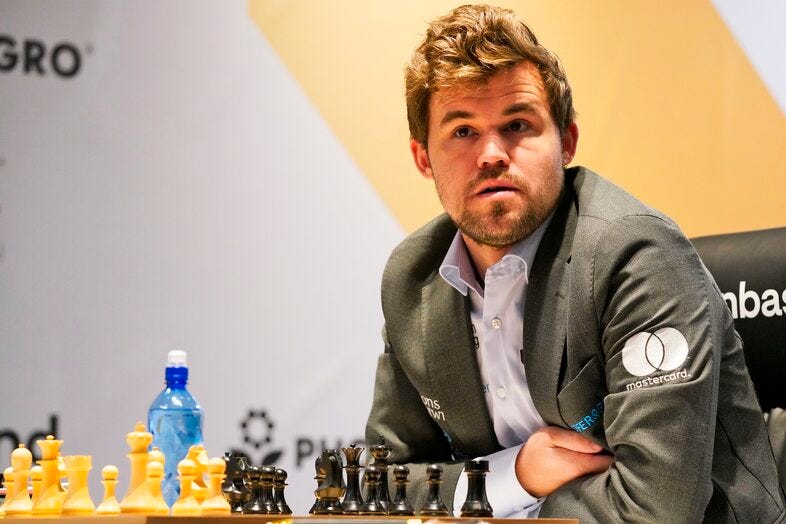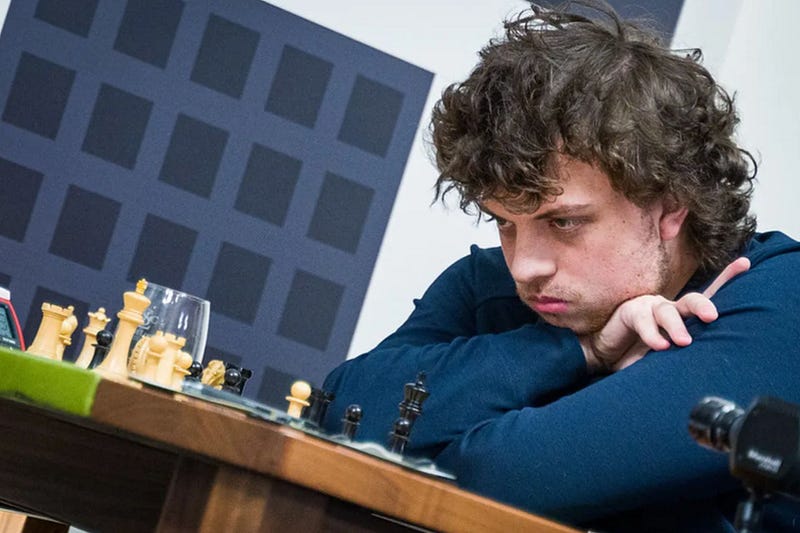
There is tension in the world of…chess? I had a hard time believing it myself, but here we are: a sport (the International Olympic Committee recognizes chess as a sport) that usually only gets as tense as “the white piece might take the black piece” is going through some bona fide drama. Magnus Carlsen, chess grandmaster extraordinaire and world number one, has taken to withdrawing from tournaments as of late under the assumption that Hans Neimann, a 19-year-old rival, is cheating. On Sept. 4, Carlsen lost to Neimann in the Sinquefield Cup and promptly withdrew from the tournament. A rematch was slated for Sept. 19, only for Carlsen to withdraw again, this time after playing just one move. He released a Twitter statement on Sept. 26 explaining his actions.
The meat of Carlsen’s statement on his most recent withdrawal reads as follows:
“I believe that Niemann has cheated more — and more recently — than he has publicly admitted. His over the board progress has been unusual, and throughout our game in the Sinquefield Cup I had the impression that he wasn’t tense or even fully concentrating on the game in critical positions, while outplaying me as black in a way I think only a handful of players can do. This game contributed to changing my perspective.”
It is worth pondering the possibility that Carlsen is right. Niemann has publicly admitted to cheating on Chess.com, most recently when he was 16, which caused him to get booted from the site. So there is some precedent, the fact that one can change as much between 16 and 19 as Commons food did for Parents’ Weekend notwithstanding. “I don’t want to play against people that have cheated repeatedly in the past,” Carlsen wrote, “because I don’t know what they are capable of doing in the future.” If Niemann is cheating, chess has a code red situation. While people once confidently declared a computer could never beat a grandmaster in chess, we have since developed computers that can beat any chess player without fail. Computers have even mastered Go, a game way more complex than chess (a chess board is eight by eight; a Go board is 19 by 19), with the program AlphaGo beating then-world-number-one Go player Ke Jie in three games out of three. If Niemann is indeed employing the services of a computer program, and is avoiding detection, there is no stopping him on the board.

How does one cheat in chess? You would think it would be difficult. There are only so many tricks one can pull while sitting across from another human being at a table. This has not stopped the Internet from wildly speculating, however, with Elon Musk suggesting via Twitter that vibrating anal beads might be the golden ticket.
Now for some necessary context. Per
The Guardian
, Kenneth Regan — considered the foremost expert on cheating in chess — has scanned Niemann’s games over the past two years and has found no evidence of cheating. Magnus Carlsen is an extraordinary chess player, and I am sure he trusts his chess instincts without reservation. But he is taking an incredible risk by making these accusations on a hunch alone. The mere possibility of being wrong about Neimann cheating seems like it should be more than enough of a deterrent to publicly accusing a fellow player of cheating. What if Neimann just beat him straight-up in the Sinquefield Cup, and it sent Carlsen into a paranoid tailspin? Imagine what the headlines would look like.
I think Carlsen’s legacy is at risk of suffering a serious stain. His Wikipedia entry currently states that he owns the highest peak rating in chess history, at 2882. He is the reigning five-time World Chess Champion, the three-time World Rapid Chess Champion, the five-time World Blitz Chess Champion. Being wrong about a rival cheating, and stirring up a storm of controversy in the process — not to mention potentially wrecking Niemann’s reputation — seem nearly as headline-worthy as his accolades. Maybe Carlsen is right, and if he is, I will happily eat all my words and bow down to his ineffable instincts that allow him to detect cheating as well as conquer the chess world, but right now, I don’t see it.
It is practically consensus at this point that people need a specific mindset to be the best in the world at anything. I am a tennis fan, and I sometimes shake my head and laugh when someone barely inside the top 50 confidently declares that they can beat the world number one shortly before having their hide handed to them, but that is the attitude required in the dog-eat-dog world of professional competition. There is no room for questioning oneself, for self-doubt, for anything except the pure confidence of success, because the slightest hint of indecision can prove fatal in a decisive moment. The best at their craft know this more intimately than anyone else.
But that mindset also comes at a cost, which is why we are seeing Aaron Rodgers emerge as a pseudoscientific maniac, Novak Djokovic neglect to get vaccinated for no good reason and a litany of other top athletes floating bizarre medical or political takes with immense amounts of unearned confidence. You can pass it off as mere foolishness, sure, but their mindsets just do not allow them to consider the possibility of being wrong. I think Carlsen is suffering from a similar syndrome. I hope he changes his mind and plays Neimann again, either to give Neimann a chance to confirm that he is cheating if he is guilty or to give him a chance to play if he is innocent; I fear he is incapable of it.
























